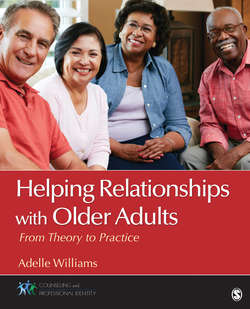Читать книгу Helping Relationships With Older Adults - Adelle M. Williams - Страница 43
На сайте Литреса книга снята с продажи.
Language
ОглавлениеNormal aging causes widespread changes in the brain, many of which could be expected to impact language functions. However, in the absence of disease (such as Alzheimer’s dementia) or stroke, which can have serious consequences for language, it is generally found that older adults perform much like younger adults on language comprehension tasks, and indeed, that vocabulary and other kinds of knowledge can increase throughout the life span (Cognition and Brain Lab, 2015). Vocabulary increases well into the 50s and 60s and shows no decline with age in those who continue to be engaged in complex language use. Similarly, syntactic skills, the ability to combine words in meaningful sequences, show no decline with pure aging. Subtle differences in performance on language tasks occur after middle age. Some of these changes such as poorer speech processing and less accuracy is related to the loss of auditory (hearing) acuity. Older people have more difficulty finding specific words and making inferences from complicated discourse. However, knowledge of words and the understanding of real-world expectations, as well as storytelling skills, appear to remain unimpaired (Clark-Cotton, Williams, Goral, & Obler, 2007).
Declining language skills have been associated with diminishing cognition, overall health, factors of fatigue, and a variety of social variables (level of education, gender, culture, and socioeconomic status), behavioral factors (motivation and interest), and comfort of the assessment environment. Disease can compound any language usage. For example, a transient ischemic attack (TIA), also referred to as a mini stroke, will interfere with the ability to speak. Also, a childhood language disorder (stuttering) if left undiagnosed and untreated, will lead to problems with disordered language production in older adulthood (Clark-Cotton et al., 2007). However, most older adults communicate successfully throughout most of their lives.
